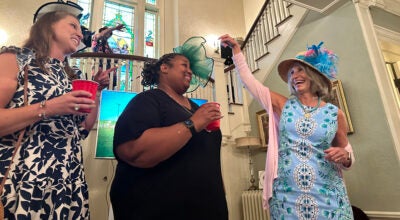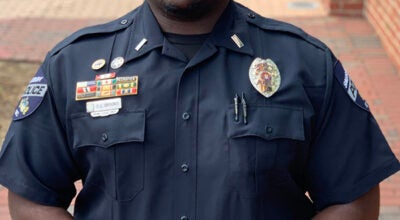Amendment One: Efforts to define marriage draw sharp opinions
Published 12:00 am Saturday, April 21, 2012
By Karissa Minn
kminn@salisburypost.com
SALISBURY — Some in Rowan County call it defense, while others call it discrimination.
A constitutional amendment on the North Carolina primary ballot, known as “Amendment One,” would limit marriage to one man and one woman. It also would ban other “domestic legal unions.”
Same-sex marriage is already illegal in North Carolina, but Spencer resident Dan Robertson said the goal is to keep “activist judges” from overturning the law.
“They’re forcing us to accept a sinful lifestyle, and we can’t do it,” Robertson said. “For us to do that would be betraying what we believe.”
Bill Stanback, of Salisbury, said he knows from raising a daughter who is a lesbian that being gay is not a choice. He and other opponents of the amendment don’t think it’s necessary.
“We would like to see that law repealed, but right now, we just don’t want to see an amendment placed in Constitution,” he said.
North Carolina is the last remaining state in the Southeast without a constitutional ban on same-sex marriage. Arizona voters rejected an amendment banning both gay marriage and civil unions in 2006, but they approved one only dealing with marriage in 2008.
To date, similar amendments have passed in 29 states that have placed them on the ballot.
Stanback said his daughter Anne, who is married to a woman, successfully worked to legalize gay marriage in Connecticut.
“If you’re in love and live with somebody, and you want to take care of someone and be taken care of, the idea of being married is a very important thing to some individuals,” he said.
Many amendment supporters say they believe marriage is sacred and designed by God, and outside forces should not be able to redefine it.
Stanback said Jesus himself did not say anything about being gay or same-sex marriage. But others point to passages elsewhere in the Bible that speak against homosexuality.
“I believe that God put man and woman on this earth together to be a symbol for marriage,” said Kate Robertson, Dan’s wife.
According to the conservative-leaning Civitas Institute, in a March survey of 600 registered voters, 62 percent support the amendment and 31 percent oppose it.
But another poll suggests that North Carolina could defeat the amendment — as long as voters know what it actually does.
In a March survey of more than 1,000 likely primary voters by Public Policy Polling, 58 percent said they would support the amendment and 38 percent said they would oppose it.
The numbers are nearly even, though, among the 31 percent who know the amendment would ban both gay marriage and civil unions. Of those, 41 percent of those support it and 42 percent oppose it.
• • •
Rick Anderson McCombs, of Salisbury, said he thinks the amendment is “redundant and divisive.”
“I believe it no longer gives us as Americans the right to define what we believe to be our family,” he said. “The government is defining for us what marriage is.”
He said he married Scott McCombs 25 years ago, even though it wasn’t recognized legally, because at the time Scott saw it as a sin to live together while unmarried.
It should be up to each couple — gay or straight — to define their marriage, according to their own faith or lack of it, Rick said. He hopes people will “live and let live, and let God judge us all.”
Rick and Salisbury resident Daryl Bruner both said the amendment “writes discrimination into the constitution.”
Bruner said he’s also worried about the message Amendment One would send to businesses that want to grow and expand here.
Spencer residents Joy Mills and Ronnie Hudgins both said they support the amendment because of their beliefs in God and the Bible.
Hudgins said he wants to “stand up for my rights.” He shares a common concern with Mills and some other supporters, who are worried that Christians will no longer be allowed to support what they believe to be right and wrong.
Bob Lambrecht, of Salisbury, said he doesn’t know why marriage is considered to be so holy when half of them end in divorce.
He said he’s been with the same man, who he married in California, for 28 years.
“Has my marriage hurt anybody?” Lambrecht said. “I don’t know what could hurt anybody.”
He said he doesn’t know why people want to “push hate” when there’s already a law on the books keeping gay couples from getting married.
Mills said she doesn’t hate gay people or want to stop them from being together.
“They are different in the way they live, and we don’t agree, but I certainly don’t hate them at all,” she said. “It’s just not marriage. It’s not how God intended it to be.”
Jim Sentilles, of Salisbury, used to have signs in his yard supporting the amendment, but he eventually took them down.
Sentilles said he’s not taking either side in the debate.
“Marriage was instituted by God to be between a man and a woman and between them and God,” he said. “The government ought to keep its nose out of it.”
• • •
Rev. David Cowger, of World Hope Worship Center in Salisbury, says he tries to make every decision using guidance from the Bible, and this one is no different.
“One man and one woman — that’s how God has designed marriage and the family unit,” he said.
That’s the foundation that strong families are built on, Cowger said, and he’s seen the damage that happens when the family structure collapses.
“It’s not about the love that they have for one another, and it’s not that they won’t love their children,” he said.
But for Cowger, redefining marriage to include gay couples — or even giving them the same legal recognition — goes against God’s word and his guidance.
Rev. Whayne Hougland, of St. Luke’s Episcopal Church in Salisbury, says his faith leads him to a different conclusion.
“In the Episcopal tradition, we have a baptismal covenant that we acclaim as part of joining the Christian faith,” Hougland said. “Part of that covenant says we will strive for justice and peace among all people and respect the dignity of the human being. … This amendment seems to do just the opposite of that.”
For Hougland, the amendment is more of a legal issue than a Scriptural one. It’s about trying to keep a minority group from having certain rights, he said.
He said he’s also concerned that the amendment would have far-reaching effects on families and couples who are not married.
“Any legislation that has the potential to do legal harm is categorically and profoundly un-Christian,” Hougland said.
He said he respects those who support the amendment, and it’s possible to keep the definition of marriage the same while recognizing other relationships.
Churches can choose whether or not to bless a marriage or other union, he said, and some people already decide to skip the religious blessing altogether when they wed.
“I basically feel that there are other forms of relationships that should be valued and given all access to legal protection that may look different than traditional marriage,” Hougland said. “The issue shouldn’t be whom you love, the issue should be how you love and that you love.”
Even though the “homosexual lifestyle” is sinful according to Cowger’s faith, he said it is no worse than any other sin.
Cowger said he believes Christians should seek to understand — not judge — people who disagree with them.
“We should be respectful and be open to understanding,” he said, “because behind every life is a story.”
Contact reporter Karissa Minn at 704-797-4222.
Twitter: twitter.com/postcopolitics
Facebook: facebook.com/ Karissa.SalisburyPost



